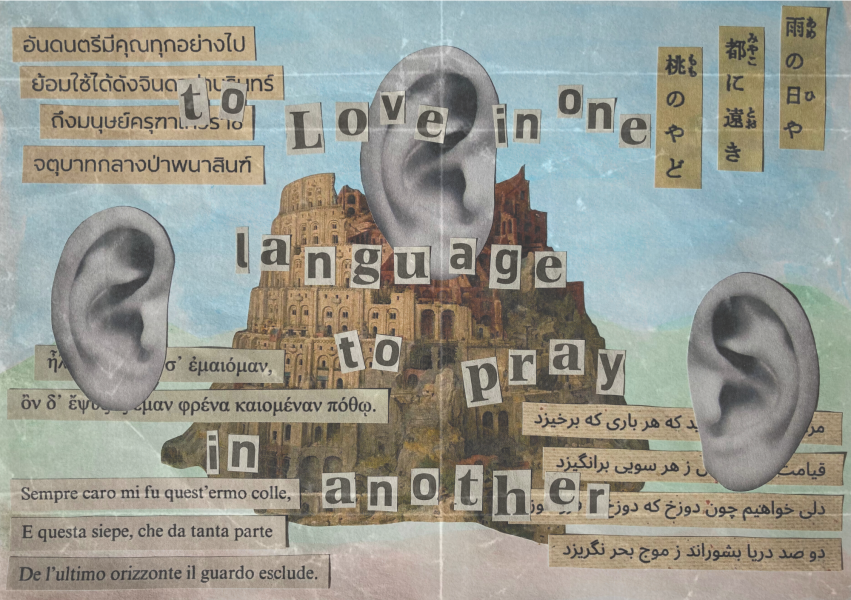Why do some languages sound better than others? Is there a language better suited for poetry? And does everyone have the same opinion about it?
French is the language of love, Italian is the language of music, English is the language of business… Different languages have different connotations, both positive and negative. Is the common opinion purely based on linguistic elements of a language, or is it more of a cultural phenomenon?
Languages and their connotations
There seems to be an overall consensus among English speakers that the most beautiful languages in the world are Italian, Spanish, or French, while German and East European languages are often disregarded as rough and harsh. But if you ask any native French or German speaker, their opinion will probably differ.
As with most things, it all comes down to cultural factors, and some languages just have a reputation of being considered beautiful. Take Italian for example: is the language really that charming, or is it only what non-Italian speakers associate it with? Italian is often connected with musical speech and opera, giving it a mesmerizing aura. At the same time, other languages have an opposite effect. German is often associated to the history of the Third Reich, influencing how people see it. If most American movies depict German speakers as villains, it is unsurprising that the language itself has a bad reputation, despite its distinct beauty.
Opinions around the world
But what about the rest of the world? What do other countries consider to be the most beautiful language? A study conducted by linguists at Lund University might give some insight into the topic.
The study involved native speakers of three major linguistic groups: English speakers, Chinese speakers (from different regions and dialects), and speakers of Semitic languages such as Arabic and Hebrew. The final result is unsurprising: no language was favorite globally. However, there were some patterns worth looking at.
Languages with more consonants, which are harder to pronounce to non-native speakers, were found to be the most scorned. Among these are the lesser-known Chechen and Avar. The research also found another pattern: tonal languages such as Chinese and Vietnamese scored on average lower than non-tonal languages. Tonal languages utilize tonal inflection to give different meanings to words, which means that each syllable is stressed in a specific manner. Most interestingly, this aversion towards tonal languages was especially relevant in the Chinese speaker group.
But the main result found by the study was something else altogether: generally, a favorite language was not defined by its phonetic or structural elements but by whether the listener recognized the language or not. This is why common languages ranked higher, while lesser-known ranked lower.
Each language has some elements that make it different, such as phonetic or structural elements. These variations can be perceived as unnatural and consequentially less charming. However, if a person is familiar with specific phonetic patterns, these don’t seem so weird anymore. This might explain the results: in the Chinese-speaking group, Mandarin ranked first, followed by English and Japanese. In the Semitic language group, Spanish was the favorite language, then English and Italian, while the English-speaking group favored English first, then Italian, and then Jamaican Creole English.
This familiarity bias was also found in other languages. Creole languages, born from a mixture of native languages and colonial influences such as English, French, or Spanish, were also rated higher because they have similar phonetical patterns to widely known languages.
No language is thus universally seen as more beautiful, but the simple recognition of it influences how a person views it. But what about when language becomes poetry?

The language of poetry
Poetry is the highest form of language, with each word carefully chosen to precisely express what a person wants to convey. Are there languages that are more suited for it than others? Is a language with a richer vocabulary better for poetry, or maybe one with a freer sentence structure?
Poetry has existed all around the world since ancient times, shaping cultures and literary landscapes. There are many different factors that allow a language to be better suited for poetry, and each civilization has utilized its strengths to create a poetic form that worked for them.
One example of a characteristic that allows for easier poetry writing is the flexibility in word order. Languages that have an extensive inflection system, changing words to indicate their role in a sentence, have the freedom to arrange words in the best way to rhyme them or emphasize something. This is characteristic of ancient languages such as Latin or Ancient Greek, as well as Russian. The ambiguity in Japanese sentence structure can also be a powerful poetic tool.
But word structure is not the only criterion. French, Italian, and Spanish seem to have a predisposition for poetry, maybe due to their rich vowels and natural rhythm. For example, perfect rhymes are easily achievable in Italian due to the language’s regular syllabic structure, consistency in the endings of nouns and verbs, and high frequency of syllables ending with vowels. It is no surprise then that an oeuvre such as the Divine Comedy by Dante was written in Italian, with its extensive rhythmic pattern of interwoven rhymes that spans the entire text:
Nel mezzo del cammin di nostra vita / mi ritrovai per una selva oscura, / ché la diritta via era smarrita. / Ahi quanto a dir qual era è cosa dura / esta selva selvaggia e aspra e forte / che nel pensier rinova la paura!
When half way through the journey of our life / I found that I was in a gloomy wood, / because the path which led aright was lost. / And ah, how hard it is to say just what / this wild and rough and stubborn woodland was, / the very thought of which renews my fear!
Italian allows for a very different poetic form than a language like English, which has a limited set of words that rhyme perfectly. This is why English mostly uses imperfect rhymes or why it has created poetic forms with an emphasis on rhythm rather than on rhyme scheme.
There are other languages with their own poetic form. One of the most widely known is the Japanese haiku, which consists of three lines with five–seven–five syllables respectively. This form is perfect for the syllabic structure of the language, as well as its lack of complex consonant structure and its gentle and rhythmic flow. An example by the famous 18th-century poet Buson is:
Sakura chiru / Nawashiro-mizu ya / Hoshi-zuki-yo.
Cherry blossoms fall / On watery rice-plant beds: / Stars in the moonlight.
Japanese poetic form was largely influenced by Chinese Tang and Song dynasty poetry. Because of the concise and character-based structure of the language, poetic form in China dates back thousands of years. A particular characteristic is that each character can carry multiple meanings, allowing for layers of interpretation. The characters also allow for a visually compact poem, which is lost with languages that utilize different writing systems. The poem Xiāng Sī(Lovesickness) by the poet Wang Wei is a beautiful example:
红豆生南国
春来发几枝?
愿君多采撷,
此物最相思。
Red beans grow in the southern lands,
How many branches fall when spring arrives?
May the gentleman gather many of them
This is what makes him the most lovesick.
Arabic is another language that allows for multiple meanings in each word. Both Persian and Arabic also have a deep poetic tradition, with forms such as ghazal and qasida. Persian is a very descriptive and lush language, perfect for romantic and mystical themes, which are at the core of Persian poetry. One of the most famous poets is Rumi, translated from Persian:
My lover must be such that every time he rises,
Resurrections of fire would arise from every corner.
I want a hellish heart, swallowing the hell down of hell,
To turn a thousand seas upside down, an ocean wave won’t be a bother.
Whose light would cut through the hundred veils of heart,
A sound of such melody from his throne; mashalla!
To conclude, no language is better suited for poetry. However, it is very interesting to observe how each language has utilized its strengths to create a particular poetic form with specific rules. The Italian sonnet, the Japanese haiku, and the Persian ghazal are very different from one another, but they all work perfectly, and most beautifully, in their native tongue. A language is not inherently more alluring than another, but by employing its strengths, each language becomes a beautiful attestation of the power it can have.

